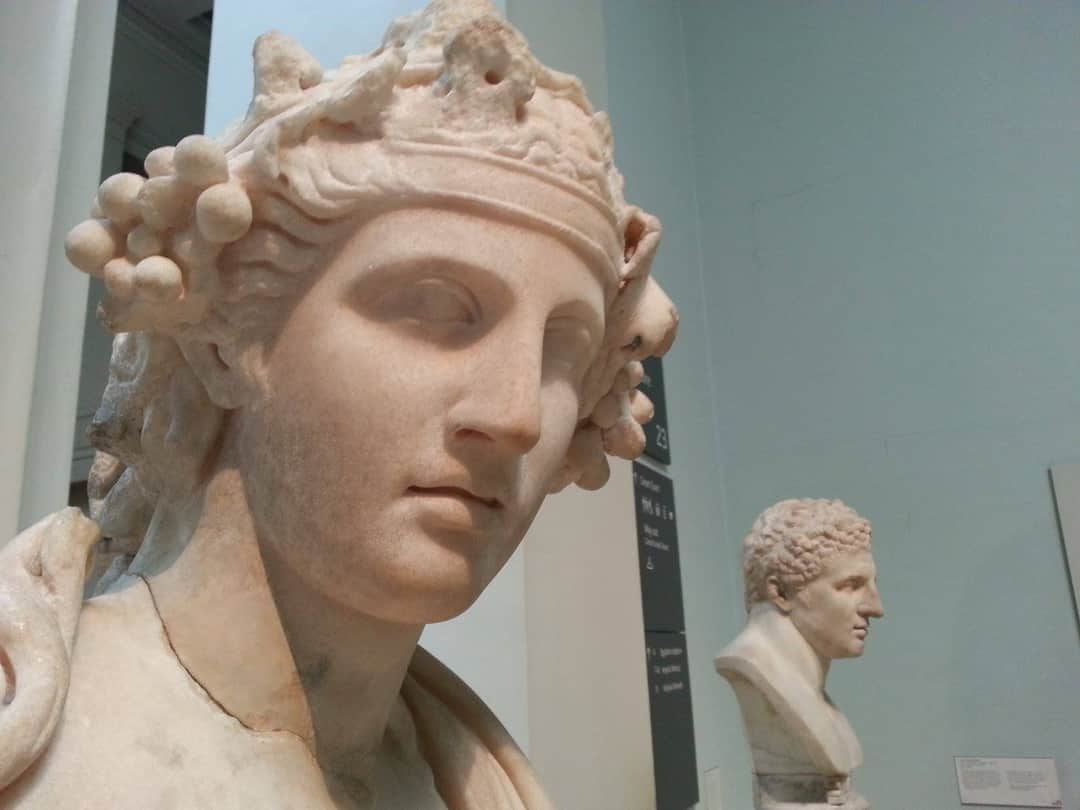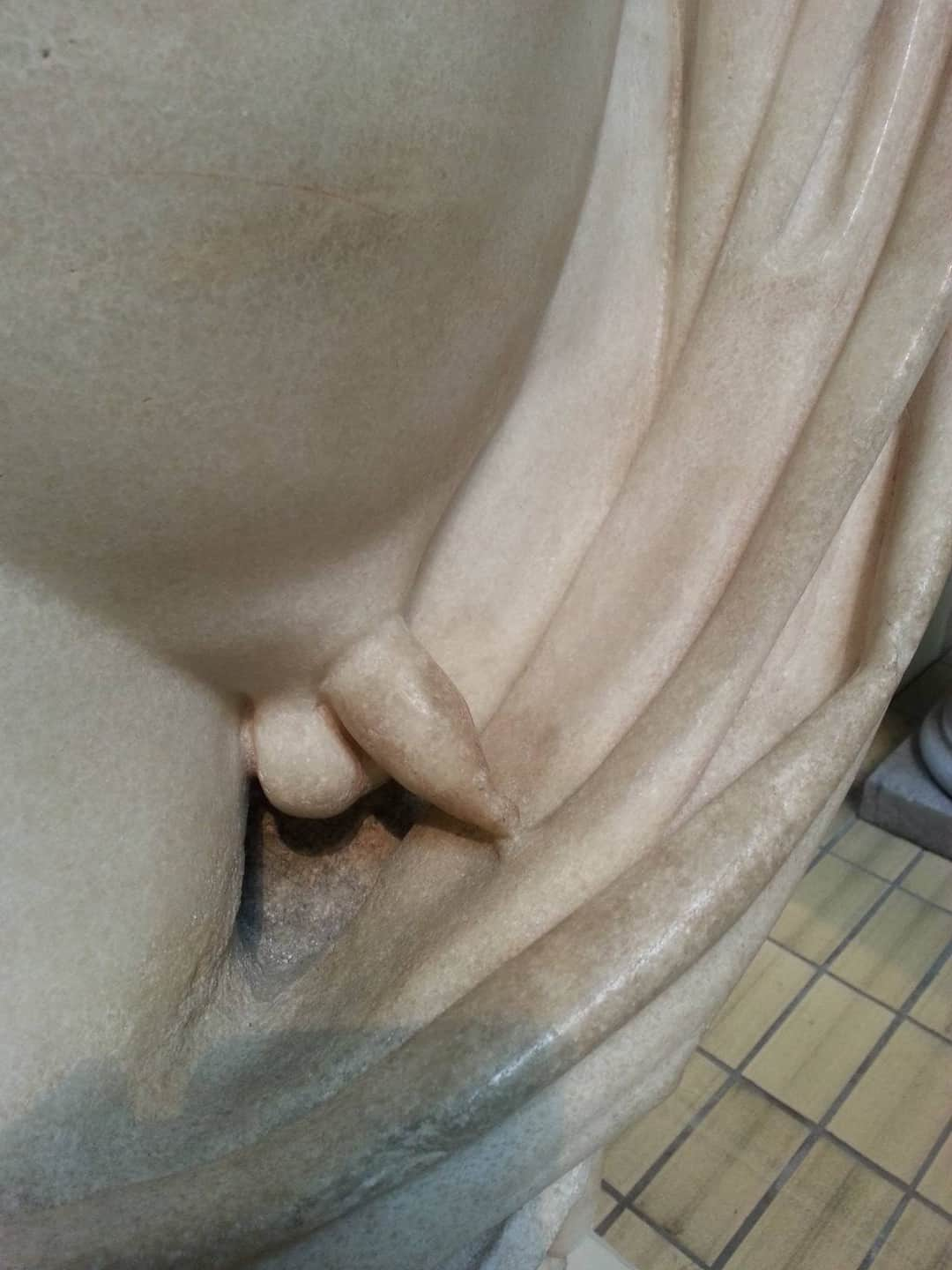
쪼매나다.
포도는 크다.

하나도 안부끄럽단다.
꿀릴 게 없단다.

자연포경인 나한테 자신감 심어주는 너가 좋다.
너보단 내가 크다.
브리티시 뮤지엄 The British Museum, London 이 소장한 디오니소스 Dionysos, 포도주의 신 God of Wine, 바쿠스 Bacchus 다. 바쿠스는 중년 모습으로 묘사되는 일이 많은데 이건 청년이다.
Lybia Cyrene, Temple of Dionysos, Roman, 2nd century AD 출토품이다. Made from large-grained, white marble 이며 Height는 171 cm.
Discovered in Cyrene, a Greek colony on the Mediterranean shore of modern Libya that continued to thrive under the Roman Empire, it depicts Dionysos, the god of wine, who can be recognised by his characteristic attributes, an ivy wreath and a bunch of grapes.
Usually Dionysos has been shown as an older bearded god, over time Dionysos became a young and sensuous male. His head is turned to the right and long strands of hair fall over his shoulders.
The god wears sandals and a long himation (mantle) that is draped over his left shoulder and back and then forward and over his raised left arm, but leaves his muscular torso and genitals exposed. The deep folds of the himation are carved in fine detail. The back of the statue, though worked, appears flat, indicating that it was meant to stand in a niche or against a wall.
It must have been made by skilled sculptors of the second century AD after an earlier Greek work of the third century BC.
Like almost all ancient sculpture, the statue was originally at least partly painted; traces of red colour are preserved in the eyes and the wreath. In antiquity the body itself would have been left untouched except for small details like the nipples, so that the skin-coloured surface of the marble would have contrasted beautifully with the painted drapery.
With the statue were found a statue of a panther with a collar of vine leaves, which usually accompanies the god, and a pedestal, on which the statue is thought to have stood.
The building in which it was discovered has been identified as the Temple of Dionysos.
Dionysos (Bacchus) was the Greek god of wine and mystical ecstasy. Dionysos was the son of Zeus and Semele. Hera, jealous of the liaison, tricked Semele into asking to see Zeus as he appeared on Mount Olympus. Mortal Semele was consumed by the thunder and lightening of his divine presence. Zeus rescued her unborn child and sewed it into his thigh, from which Dionysos was later born.
He was raised by the messenger god Hermes, who left him with various foster-parents and nurses, always hiding from Hera's wrath.
Dionysos' wanderings were said to have taken him as far afield as India, and certainly there were many eastern elements in his cult. He travelled with a band of satyrs (wild men, often with horses' ears and tails), seileni (older satyrs) and maenads, female followers habitually shown draped in animal skins and carrying a thyrsos.
The intoxicated and ecstatic orgiastic rites of this band included rioting in the countryside, sexual licence and dismembering wild animals. Many tales were told of the madness inflicted by Dionysos on those who were resistant to his cult.
Dionysos had love affairs with mortals, notably with Ariadne, whom he found abandoned by Theseus on Naxos, and was father to mortal children. He himself was always a god, however, and eventually took his place amongst the Olympians, apparently after a reconciliation with Hera.
'문화재현장' 카테고리의 다른 글
| 만들어진 Jott, 그 생성 비밀을 파헤치다 (0) | 2020.07.28 |
|---|---|
| 반달 모양 돌칼로 이삭줍기하던 그때 (0) | 2020.07.28 |
| 이 친구가 원하는 바는 (0) | 2020.07.27 |
| 삼겹살 굽는 아크로폴리스 (1) | 2020.07.27 |
| 줄 설 필요가 없는 아테네 (0) | 2020.07.27 |




댓글